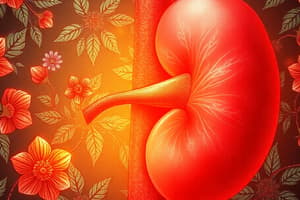Podcast
Questions and Answers
What is the primary therapeutic use of urinary tract stimulants?
What is the primary therapeutic use of urinary tract stimulants?
- Relaxation of detrusor muscles
- Prevention of urinary incontinence
- Treatment for urinary retention (correct)
- Control of nocturia
Which of the following mechanisms of action is associated with urinary tract stimulants?
Which of the following mechanisms of action is associated with urinary tract stimulants?
- Stimulation of cholinergic receptors (correct)
- Stimulation of beta-3 adrenergic receptors
- Inhibition of cholinergic receptors
- Relaxation of urethral sphincter
What is a common adverse effect of the drug bethanechol?
What is a common adverse effect of the drug bethanechol?
- Urinary urgency (correct)
- Dizziness
- Dry mouth
- Constipation
What is the role of oxybutynin in the management of urinary conditions?
What is the role of oxybutynin in the management of urinary conditions?
Which adverse effects are associated with cholinergic symptoms?
Which adverse effects are associated with cholinergic symptoms?
Which substance is known to cause SLUDGE symptoms?
Which substance is known to cause SLUDGE symptoms?
What adverse effects might be expected from the use of anticholinergic medications like oxybutynin?
What adverse effects might be expected from the use of anticholinergic medications like oxybutynin?
Which statement accurately describes the action of beta-3 adrenergic agonists in urinary treatment?
Which statement accurately describes the action of beta-3 adrenergic agonists in urinary treatment?
What is the primary action of spironolactone?
What is the primary action of spironolactone?
Which condition is primarily treated with osmotic diuretics like mannitol?
Which condition is primarily treated with osmotic diuretics like mannitol?
What is a common side effect of spironolactone?
What is a common side effect of spironolactone?
What is the mechanism of action of carbonic anhydrase inhibitors?
What is the mechanism of action of carbonic anhydrase inhibitors?
Which of the following is a potential complication of mannitol administration?
Which of the following is a potential complication of mannitol administration?
What electrolyte imbalance is most commonly associated with the use of carbonic anhydrase inhibitors?
What electrolyte imbalance is most commonly associated with the use of carbonic anhydrase inhibitors?
What is a contraindication for the use of spironolactone?
What is a contraindication for the use of spironolactone?
In which situation would osmotically active agents be avoided?
In which situation would osmotically active agents be avoided?
What is the primary mechanism of action of tamsulosin?
What is the primary mechanism of action of tamsulosin?
Which side effect is commonly associated with the use of finasteride?
Which side effect is commonly associated with the use of finasteride?
What condition is NOT recommended to be treated with furosemide?
What condition is NOT recommended to be treated with furosemide?
What is a potential risk of using tamsulosin for longer than 2 days?
What is a potential risk of using tamsulosin for longer than 2 days?
Which of the following best describes the action of 5-alpha-reductase inhibitors?
Which of the following best describes the action of 5-alpha-reductase inhibitors?
What is the primary mechanism by which Mirabegron increases bladder capacity?
What is the primary mechanism by which Mirabegron increases bladder capacity?
Which side effect is NOT commonly associated with Pentosan Polysulfate Sodium?
Which side effect is NOT commonly associated with Pentosan Polysulfate Sodium?
What is the main action of antibiotics used as treatment for UTIs?
What is the main action of antibiotics used as treatment for UTIs?
What unique characteristic does Phenazopyridine offer for UTI symptom management?
What unique characteristic does Phenazopyridine offer for UTI symptom management?
Which of the following is a common side effect of Fosfomycin?
Which of the following is a common side effect of Fosfomycin?
What is the role of antibiotics in the treatment of UTIs?
What is the role of antibiotics in the treatment of UTIs?
Which medication is specifically indicated for treating symptoms of interstitial cystitis?
Which medication is specifically indicated for treating symptoms of interstitial cystitis?
Which antibiotic is known to cause infrequent side effects such as urticaria and nervousness?
Which antibiotic is known to cause infrequent side effects such as urticaria and nervousness?
What is a common side effect of thiazide diuretics?
What is a common side effect of thiazide diuretics?
Which condition is treated effectively by thiazide diuretics?
Which condition is treated effectively by thiazide diuretics?
Which electrolyte disturbance is commonly associated with thiazide diuretics?
Which electrolyte disturbance is commonly associated with thiazide diuretics?
What mechanism do thiazide diuretics utilize to reduce blood pressure?
What mechanism do thiazide diuretics utilize to reduce blood pressure?
What is a potential serious adverse effect associated with thiazide diuretics?
What is a potential serious adverse effect associated with thiazide diuretics?
Which of the following side effects is NOT commonly associated with thiazide diuretics?
Which of the following side effects is NOT commonly associated with thiazide diuretics?
What condition can thiazide diuretics help prevent by blocking Na & Cl reabsorption?
What condition can thiazide diuretics help prevent by blocking Na & Cl reabsorption?
Which of the following symptoms may indicate hypotension due to thiazide treatment?
Which of the following symptoms may indicate hypotension due to thiazide treatment?
Flashcards are hidden until you start studying
Study Notes
Urinary Tract Stimulant
- Bethanechol (Urecholine) is a drug that stimulates cholinergic receptors of the GU tract.
- It causes relaxation of the trigone muscle and opening of the urethral sphincter which enhances detrusor muscle tone.
- This ultimately promotes urination and helps empty the bladder more completely.
- Possible adverse effects include flushing, sweating, urinary urgency, nausea/vomiting, hypotension, SLUDGE (Salivation, Lacrimation (excessive tear production), Urination, Defecation, GI upset, Emesis).
Urinary Tract Antispasmodic
- Oxybutynin (Ditropan) is a urinary tract antispasmodic.
- It inhibits cholinergic receptors in the bladder, causing relaxation of detrusor muscles.
- This helps to improve urinary symptoms related to an overactive bladder such as frequency, urgency, and nocturia.
- Possible adverse effects include dizziness, drowsiness, and anticholinergic symptoms such as dry mouth, urinary retention, constipation, nausea, blurred vision, tachycardia, anaphylaxis, angioedema, photosensitivity, and hyperthermia.
Beta-3 adrenergic agonist
- Mirabegron (Myrbetriq) is a beta-3 adrenergic agonist.
- It relaxes the detrusor smooth muscle during the storage phase of bladder fill void cycle, increasing bladder capacity.
- Possible adverse effects can include dizziness, headache, angioedema, increased blood pressure, constipation, diarrhea, nausea, urinary tract infections (UTIs), and nasopharyngitis.
Bladder Protectant
- Pentosan polysulfate sodium (Elmiron) is a bladder protectant.
- It adheres to the bladder wall mucosal membrane and acts as a buffer to control cell permeability.
- It prevents irritating solutes in the urine from reaching the bladder wall cells.
- Possible adverse effects include bleeding that may progress to hemorrhage, headache, alopecia, and GI disturbances.
Antibiotics
- Multiple antibiotics are used for the treatment of UTIs:
- Fosfomycin (Myonurol)
- Sulfamethoxazole-trimethoprim (Bactrim)
- Nitrofurantoin (Macrodantin)
- Ciprofloxacin (Cipro)
- These antibiotics kill or reduce the amount of pathogens typical to UTIs.
- Adverse effects can include nausea, vomiting, diarrhea, anorexia, and dysuria. Less common side effects include blood dyscrasias, pruritus, urticaria, headache, dizziness, nervousness, and confusion.
Analgesic
- Phenazopyridine (Pyridium) is an analgesic used to treat symptoms of UTIs.
- It provides local anesthetic to the urinary tract mucosa.
- Possible adverse effects include GI upset, headache, rash, reddish-orange coloring of the urine, staining of contact lenses, and renal and hepatic toxicity.
- It is not recommended to use this drug for longer than 2 days.
Peripherally-acting Alpha Adrenergic Blockers
- Tamsulosin (Flomax) is a peripherally-acting alpha adrenergic blocker.
- It blocks adrenergic receptors in the prostate causing relaxation of prostate smooth muscles and improved urine flow.
- It can sometimes cause dizziness, headache, retrograde/diminished ejaculation, and rhinitis (nasal congestion).
5-Alpha-reductase Inhibitors/Androgen Inhibitors
- Finasteride (Proscar) is a 5-alpha-reductase inhibitor, used to treat BPH and baldness.
- It inhibits the enzyme 5-alpha reductase, which converts testosterone to the form in which it enlarges the prostate.
- Possible adverse effects include gynecomastia (enlarged male breast), prostate cancer, decreased libido, decreased volume of ejaculate, erectile dysfunction/infertility, angioedema, and breast cancer.
Loop Diuretics
- Furosemide (Lasix) is a loop diuretic.
- It binds to the chloride transport channel in the Loop of Henle, causing sodium, chloride, and potassium loss in urine and preventing reabsorption of water.
- Possible adverse effects include dehydration, electrolyte imbalances (hypokalemia, hyponatremia, hypotension), ototoxicity, hyperglycemia, rash, hypomagnesemia, hypovolemia, metabolic alkalosis, aplastic anemia, agranulocytosis, erythema multiform, and SJS (toxic epidermal necrolysis).
Thiazide Diuretics
- Hydrochlorothiazide (Hydrodiuril, HCTZ) is a thiazide diuretic.
- It blocks sodium and chloride reabsorption in the early distal convoluted tubule, preventing water reabsorption.
- Possible adverse effects include dehydration, hypokalemia, hyponatremia, hypotension, SJS, hypergylcemia, hypomagnesemia, hypophosphatemia, hypercholesterolemia, hypovolemia, and hyperuricemia (high level of uric acid in the blood).
Potassium-sparing Diuretics
- Spironolactone (Aldactone) is a potassium-sparing diuretic.
- It blocks the action of aldosterone, resulting in potassium retention and sodium and water excretion.
- Possible adverse effects include hyperkalemia, amenorrhea, gynecomastia, impotence, SJS, dizziness, clumsiness, headache, arrhythmias, and erectile dysfunction/impotence. It is typically not used for RF.
Osmotic Diuretics
- Mannitol (Osmitrol) is an osmotic diuretic.
- It raises serum osmolality drawing fluid back into the vascular space and promoting renal excretion.
- It is mainly used to prevent kidney failure in severe hypotensive situations (shock).
- It is also used to decrease intracranial pressure (ICP) or intraocular pressure (IOP).
- Possible adverse effects include heart failure, pulmonary edema, renal failure, dehydration, electrolyte imbalances (Na, K+), hypokalemia, phlebitis at the IV site, and transient volume expansion.
Carbonic Anhydrase Inhibitors
- Acetazolamide and Dichlorphenamide are carbonic anhydrase inhibitors.
- They block the effects of carbonic anhydrase, slowing down the movement of hydrogen ions.
- Possible adverse effects include metabolic acidosis, hypokalemia, paresthesias of extremities, confusion, and drowsiness.
Studying That Suits You
Use AI to generate personalized quizzes and flashcards to suit your learning preferences.




